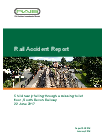Highways England is installing around 170 of the innovative LED road studs at one of England’s busiest motorway junctions – used by over 90,000 vehicles every day.
The intelligent cat’s eyes are being introduced as part of a £3 million project to improve journeys and safety at Switch Island in Merseyside, where the M57, M58 and 3 A roads all join together.
The LED road studs light up when traffic lights turn green so drivers can clearly see which lane they should follow. Cables under the road surface connect them to traffic lights through a nearby automatic controller unit.
The studs can be visible up to 1,000 metres away – far greater than traditional reflective cat’s eyes – and have been proven to help stop drivers drifting between lanes, reducing the risk of collisions.
Highways England has already installed the LED studs at Hindhead Tunnel in Surrey to guide drivers through the tunnel but the Switch Island scheme will be the first time they have been linked to traffic lights at a motorway junction.
Phil Tyrrell, Project Manager at Highways England, said:
We’re always looking for new ways to further improve journeys and safety for drivers, and I hope the new intelligent cat’s eyes will help better guide drivers around Switch Island.
The innovative light-up road studs along with the other improvements we’re introducing will make it much easier to navigate the junction, benefitting the tens of thousands of drivers who travel through it every day.
Construction work on the Switch Island scheme, which is being funded by the government’s £220 million congestion relief programme, is due to start on Monday 5 February and is expected to take around a year to complete.
The scheme is designed to improve the flow of traffic and enhance safety, following 49 collisions at the junction in the past two years – an average of one every fortnight. New traffic lights will be installed at a height of over 5 metres – higher than HGVs and double-decker buses – so that drivers approaching the junction can clearly see when the lights are changing.
Other improvements will include changes to the road layout and lane markings, new barriers between carriageways, coloured high friction surfaces and better signs. And a new 400 metre shared cycle path will be created through the junction, which will link up with the existing cycle path alongside the A5036 Dunnings Bridge Road.
Jerry McConkey, Sefton Council’s Transportation and Highway Infrastructure Service Manager, said:
We have worked closely with Highways England and Merseyside Police to look at the issues at Switch Island and develop improvement proposals.
As a result, we are delighted that these important safety measures are about to be introduced with Highways England implementing the latest technology solutions. This will further improve safety and give drivers a much higher level of confidence when negotiating this busy junction.
The new intelligent cat’s eyes which are being installed at Switch Island were designed by Oxfordshire-based company Clearview Intelligence.
Managing Director Nick Lanigan said:
The introduction of intelligent road studs, reacting to traffic light changes on a busy roundabout is a continuation of the traditional cat’s eye legacy but takes advantage of new technology available. The new studs have been proven to reduce lane transgression by over 50% in certain conditions so it’s a great way to help improve the safety for all road users.
Cat’s eyes were invented by Percy Shaw in 1933 after he was driving down a steep winding road in West Yorkshire and noticed his headlights reflect in the eyes of a cat. He realised the potential of improving road safety if he could create a reflecting device that could be fitted to road surfaces and came up with his cat’s eye invention.
General enquiries
Members of the public should contact the Highways England customer contact centre on 0300 123 5000.
Journalists should contact the Highways England press office on 0844 693 1448 and use the menu to speak to the most appropriate press officer.


